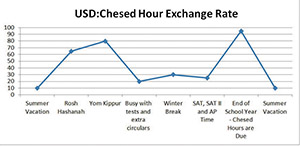
I am blessed with a fun-loving, rambunctious and somewhat mischievous toddler. Additionally, I enjoy going to movies with my wife. Oh, the quandaries of parenthood. Last week, considering the various ways to ensure the safety of my youngster while enjoying dinner and the latest summer blockbuster, I jestfully posted the following on social media:
“Anyone interested in babysitting my kid for free while my wife and I go to a movie? I’ll give you chesed hours.”
Over the past few months I’ve seen a rise in the use of chesed hours as a means of payment for a variety of household needs in our community. Offering chesed hours in exchange for babysitting children is but one example of the “chesed hours for personal services” market. Economically it’s ingenious, the servicer fulfills a high school chesed hours requirement and the services are provided at no monetary cost.
The catch, of course, is the ethics of the transaction. Chesed hours are designed to assist organizations, religious institutions, the elderly and the needy as opposed to my personal babysitting or moving needs. Local yeshiva high schools are nobly trying to develop charitable young adults; requiring students to fulfill chesed hour quotas is a means to this end.
The students who must comply with the chesed hour requirement are surely not to blame for the exploitation of the system. The student is doing me and my wife a favor by hustling after our son while we lounge in the comfy chairs at the Ridgefield Park movie theater. We, the adults, are the group taking advantage.
On a comedic note, a friend responded to my social media post suggesting that the value of chesed hours surely increases as Rosh Hashanah and Yom Kippur approach. Without question, the desire of teenagers to perform services in exchange for some verbiage on a scrap of paper is highly dependent on the perceived value, in spiritual growth/academic compliance, of the services. This paradigm results in tremendous volatility within the “USD: Chesed Hour” market. As reflected in this completely fabricated graph, the value of chesed hours peak at Yom Kippur (spiritual incentive) and at the end of the school year (academic incentive).
Encouraging youth to work on behalf of our charitable organizations and the needy builds character and is arguably more valuable than academic classes and other extracurricular activities. As a community, we should avoid taking advantage of the chesed requirements and find alternative babysitting arrangements. Enjoy the movies!
Shlomo Yaros rarely goes to the movies.
By Shlomo Yaros











